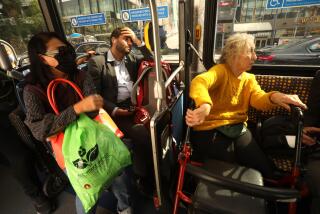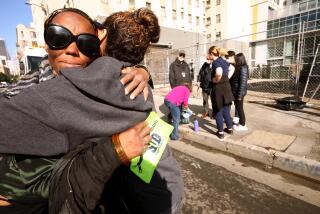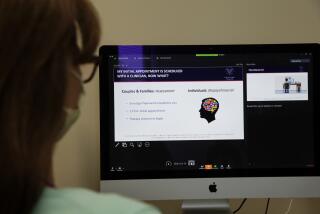Getting patients to where they need to be
He knows all about his patients: who likes to cook, whose blood pressure is out of control, who is quarreling with her husband. He keeps track of their appointments and recalls many of their phone numbers by heart.
Calvin Woodard isn’t a doctor or a nurse. Woodard is a driver. Every weekday, he ferries dozens of patients in an old white van to and from the To Help Everyone (T.H.E.) Clinic.
As the clinic’s only driver, Woodard, 59, is a critical part of its operations. He is the patients’ unofficial counselor, confidant and, perhaps most important, conscience. He reminds them about scheduled visits, even rousing them out of bed with a friendly phone call. And he urges them to get their tests and vaccinations, even if they are resistant.
Without Woodard, many patients simply wouldn’t show up for appointments. They are chronically ill but live in a world where going to the doctor is not always the top priority. In some ways, the Tennessee native develops a closer relationship with the patients than anyone else at the clinic does. That relationship can translate into results — patients getting the medical care they need.
“He has a rapport sometimes that we can’t have,” said Sharon Leffall, a nurse practitioner and the director of clinical services.
As the federal government invests in community health centers like T.H.E. Clinic and sets high expectations for them to help the nation’s newly insured patients get healthier with less costly care, centers are taking a closer look at some of the barriers facing patients and exploring what can be done to eliminate them.
That’s where Woodard and his white van come in.
Many patients of T.H.E. Clinic don’t have cars — or, if they do, they don’t have enough money to keep them registered or filled with gas. In Los Angeles County, many clinics are near bus or train stops, but patients often don’t take public transportation and regularly miss medical appointments, sometimes delaying care until they have an emergency. T.H.E. Clinic offers the rides for free.
Nicole Stewart, 29, has Woodard’s cellphone number programmed into speed dial. She said he keeps her on track with her appointments — and he comforts her whenever she is upset.
“He is like a dad I never had,” she said. “I can talk to him.”
Woodard’s daily drives take him on a meandering tour of South Los Angeles, past motels, taquerias, tattoo parlors, check-cashing shops, laundromats and churches. This morning, he picks up Pamela Stamps, one his regulars. “Yes, ma’am,” he says, his way of saying hello.
Stamps, wearing hoop earrings and bright pink lipstick, tells Woodard that she ran out of her blood-pressure medication and has been feeling sick. She missed her last appointment. “How busy it is today?” she asks him. “I swear I’m not in the mood to wait all day for some pills.”
“That mean you gonna make a scene?” Woodard asks.
Stamps tilts her head back and laughs. “Nah.”
Stamps has a car but can’t afford the registration, so she calls Woodard every time she needs a ride. “Calvin is really good people,” she said.
Most of Woodard’s patients are polite, and some even thank him with gifts: a coffee cup, a hat, cookies. Some, however, lose their temper. But he doesn’t take offense. If someone is angry, Woodard tries to cheer him up. “You sometimes can change people’s day by saying something that makes them smile,” he said.
After dropping off Stamps, he dials the number of a patient. Her daughter answers.
“It’s Calvin. Where’s Angie?” he asks.
“She’s not here. She’s at a dentist appointment.”
“She had a doctor appointment too,” he says. “You tell her she missed her appointment, to call and reschedule.”
Woodard, a stout, balding man with glasses and a Southern drawl, was born and raised in Memphis, Tenn. In Los Angeles, he held several jobs before taking a position as a driver at Watts Health Center. He stayed for a dozen years and moved to T.H.E. Clinic six years ago. At first, driving for a health clinic was just a paycheck. But now he sees it as a way to give back.
Woodard, who never married or had children, said he grew up going to church but isn’t religious. He lives by certain tenets, which he regularly throws into conversation: If you’re doing the right thing, right things happen for you. We are all going to die, we just don’t know when.
His patients help Woodard keep his life, and health, in perspective. Woodard has high blood pressure and recently had hernia surgery but said he feels grateful for being as healthy as he is.
At 1 p.m., he receives a call from the clinic. Raymond Davidson, 48, has a blood pressure of 238 over 140, and it isn’t dropping. The patient needs to go to the emergency room.
“You got a headache?” Woodard asks after picking him up.
“I don’t feel like anything’s wrong,” responds Davidson, a lanky man with a scruffy beard and missing front teeth.
Davidson says he lives around the corner from the clinic but hadn’t dropped by in a while and had run out of medication. As they arrive at Los Angeles County-USC Medical Center, Davidson gets nervous.
Woodard walks the man to the door and points where to go. “Get in line right there,” he says. “OK, Raymond, take care.”
The cellphone doesn’t stop ringing throughout the day, and Woodard rarely takes a break. Between rides, at the clinic, Woodard chats with his regulars. With a smile or a subtle hand on the shoulder, he puts them at ease.
After Stamps’ appointment, she hops back in the van. She tells Woodard the doctor wanted her to stay because her blood pressure was still high, but she just wanted to go home.
“You’re lucky,” Woodard tells her. “The other guy, we had to take him to the hospital.”
“Really? Poor thing,” she says. “I got my medicine. I’m good to go.”
In the afternoon, Melentha Chatmon, 57, needs a ride to the clinic. Chatmon says this will be her first visit; her last real interaction with a doctor was two decades ago when she was pregnant with her son. Today, she wants a referral to get glasses. Woodard tells her she needs to do more than that, suggesting that at a minimum, she should get a physical and a mammogram.
“Now that you know us, you got to come back for all kinds of appointments,” Woodard says.
“I don’t want to do all that,” says Chatmon, a stocky woman with short black braids and a nose ring.
“You need to know,” he says. “You didn’t have anywhere to go. Now you do.”
A few hours later, Chatmon comes out of the clinic. Woodard opens the van door for her.
“You got your appointment sheet?”
“Yeah, I’m coming back to see the doctor,” she responds.
“The key thing is that you’re coming back,” Woodard says.
More to Read
Start your day right
Sign up for Essential California for news, features and recommendations from the L.A. Times and beyond in your inbox six days a week.
You may occasionally receive promotional content from the Los Angeles Times.





